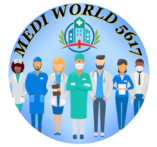IT STAFF WORKS

The IT staff in hospitals play a vital role in ensuring the smooth operation of healthcare technologies, which are integral to patient care, data management, and hospital administration. Their work spans various technical and strategic areas, from maintaining infrastructure to securing sensitive information.
Roles and Responsibilities of IT Staff in Hospitals
1. IT Manager/Director
- Primary Duties:
- Oversee all IT operations and align them with hospital goals.
- Develop and implement hospital-wide IT policies and strategies.
- Additional Tasks:
- Budgeting for IT projects and evaluating new technologies.
- Supervising the IT team and managing vendor relationships.
2. System Administrator
- Primary Duties:
- Manage servers, data centers, and hospital databases.
- Ensure the stability and performance of key systems, including EHR platforms.
- Additional Tasks:
- Regularly update and patch systems to prevent downtime or security vulnerabilities.
- Monitor and troubleshoot system performance issues.
3. Network Administrator
- Primary Duties:
- Design, deploy, and maintain the hospital’s network infrastructure.
- Monitor network traffic and ensure uninterrupted connectivity for all departments.
- Additional Tasks:
- Implement and maintain secure wireless and wired networks.
- Troubleshoot network outages and connectivity issues.
4. EHR Specialist
- Primary Duties:
- Configure, maintain, and provide support for Electronic Health Record (EHR) systems.
- Train healthcare providers on using EHR systems effectively.
- Additional Tasks:
- Ensure EHR systems meet regulatory standards like HIPAA.
- Collaborate with clinical teams to customize systems for specific needs.
5. Cybersecurity Specialist
- Primary Duties:
- Monitor and defend against cyber threats to the hospital’s data.
- Implement security protocols, such as firewalls, encryption, and multi-factor authentication.
- Additional Tasks:
- Conduct security risk assessments and audits.
- Educate staff on best practices for data security.
6. Helpdesk Technician
- Primary Duties:
- Provide technical support to hospital staff experiencing hardware or software issues.
- Resolve IT-related problems quickly to minimize disruptions.
- Additional Tasks:
- Document and escalate complex issues to higher-level IT staff.
- Maintain an inventory of IT equipment and perform basic troubleshooting.
7. Data Analyst
- Primary Duties:
- Analyze healthcare data to support decision-making, research, and quality improvement.
- Generate reports on hospital performance, patient outcomes, and resource utilization.
- Additional Tasks:
- Collaborate with departments to develop dashboards and data visualization tools.
8. Software Developer/Integrator
- Primary Duties:
- Customize or develop software solutions to meet hospital needs.
- Integrate different systems to enable seamless data exchange.
- Additional Tasks:
- Test and deploy updates or new applications.
- Maintain software documentation and user guides.
9. Biomedical IT Specialist
- Primary Duties:
- Ensure the integration and functionality of medical devices with IT systems.
- Collaborate with clinical engineering teams to maintain equipment like monitors, ventilators, and imaging systems.
- Additional Tasks:
- Troubleshoot connectivity and interoperability issues between devices and networks.
Daily Activities of IT Staff
- Monitoring and maintaining hospital IT systems, networks, and applications.
- Responding to and resolving IT-related issues and service requests.
- Updating software and hardware to ensure compatibility and performance.
- Training staff on using new technologies or systems.
- Implementing and testing cybersecurity measures.
- Collaborating with clinical teams to optimize healthcare technologies.
Key Skills Required
- Technical Expertise:
- Proficiency in hardware, software, and networking concepts.
- Familiarity with healthcare-specific systems like EHR platforms and PACS.
- Problem-Solving:
- Ability to quickly diagnose and resolve IT issues.
- Communication Skills:
- Effectively convey technical information to non-technical staff.
- Adaptability:
- Keep up with rapidly changing healthcare technologies.
- Knowledge of Regulations:
- Understanding of healthcare IT standards and data protection laws like HIPAA or GDPR.
Work Environment
- Location: Hospitals, clinics, data centers, or remote setups for specific roles.
- Schedule: Often includes 24/7 availability for troubleshooting emergencies.
- Team Collaboration: Regular interaction with clinical staff, administration, and external vendors.
Impact of IT Staff on Healthcare
- Enhanced Patient Care:
- Ensuring technology enables timely, accurate, and efficient treatment.
- Operational Efficiency:
- Streamlining workflows through integrated systems and automation.
- Data Security:
- Protecting sensitive patient and hospital information.
- Innovation:
- Introducing advanced technologies like AI and telemedicine to improve healthcare delivery.
